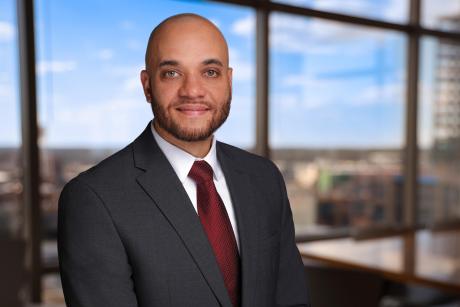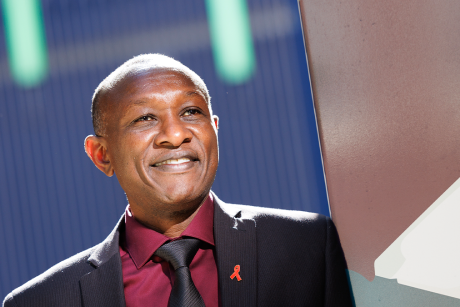A health policy expert who has helped guide the U.S. and global responses to HIV/AIDS is joining the Duke Global Health Institute, where he will lead a project aimed at reshaping the global agenda on HIV policy and research.
Jirair Ratevosian, DrPH, a former senior advisor to the President’s Emergency Plan for AIDS Relief (PEPFAR), on July 1 will become the inaugural Hock fellow with DGHI, a newly created role for early- to mid-career scholars to promote research and policy impact on HIV/AIDS and other infectious diseases. Ratevosian will work with DGHI director Chris Beyrer, M.D., the Gary Hock Distinguished Professor of Global Health.
Ratevosian has spent more than 20 years advancing public health initiatives through roles in government, nonprofits and the private sector. His work has helped bring greater focus on HIV and other diseases primarily affecting marginalized communities and generated billions of dollars of investment in global health programs.
“Dr. Ratevosian is an innovative policy researcher, has great experience in African partnerships and governmental affairs, and brings an important public-facing expertise to DGHI and to Duke,” says Beyrer, who leads research on HIV epidemiology, prevention and treatment across Africa, Southeast and Central Asia and Europe. Beyrer advised Ratevosian as he completed a doctorate in public health at Johns Hopkins University in 2022.
“I’ve always been motivated to pursue issues of social importance that I saw as an injustice,” says Ratevosian, who helped launch the Congressional HIV/AIDS Caucus in 2011, when he worked as legislative director for U.S. Rep. Barbara Lee (D-CA). “Working with Duke is an opportunity to continue to create innovative partnerships and bring together different stakeholders to solve some big challenges that remain in public health.”
Through the fellowship, Ratevosian will work with Beyrer on several projects to study and recommend steps to improve prevention and treatment of HIV both in the U.S. and internationally. A key objective will be advising global governance groups such as UNAIDS, the United Nations’ AIDS program, as they reconsider their strategic priorities at a pivotal moment in the global effort to control HIV.
“We need a complete rethink in the way that HIV is talked about and prioritized on the political agenda,” Ratevosian says. “We have the tools to manage and control HIV as a public health threat, but we won’t be able to do that unless we give attention and resources to the social and structural barriers that still exist for many groups.”
Since the first AIDS cases were discovered in the 1980s, more than 78 million people have been infected by HIV, according to UNAIDS. While significant advances in prevention and treatment have made it possible for people with HIV to manage their condition and prevent transmission to others, more than 600,000 people still die each year from AIDS-related illnesses, and more than 1.3 million become newly infected. The majority of new infections and deaths occur in low- and middle-income countries, where access to prevention and treatment remains inequitable.
In the U.S. and globally, discrimination and stigma continue to be significant barriers to accessing HIV care. Ratevosian notes, for example, that 33 U.S. states still have laws criminalizing HIV transmission, most of which were passed in the early days of the AIDS epidemic, when little was known about how the virus was transmitted.
“These kinds of criminalizing statutes contribute to the stigma that still surrounds people living with HIV, and it remains a major policy barrier we need to modernize,” he says.
Ratevosian will also use the fellowship to pursue research on how emerging technologies such as generative AI can be deployed to dismantle barriers to accessing HIV care. He says AI could offer safer routes to understanding diagnosis and prevention for people who fear discrimination from face-to-face interactions with the healthcare system.
Ratevosian will conduct most of his work through the fellowship from Washington, D.C., where he lives with his husband. Maintaining a base in the nation’s capital will also put Ratevosian in a good position to share research findings with his contacts in government and global health-related NGOs, Beyrer says.
“At a time when the U.S. commitment to global health funding has been increasingly challenged, it is vital for DGHI to have a strong policy presence in the capitol. Jirair has years of experience in leadership both on the Hill and in programs like PEPFAR, which have saved millions of lives,” Beyrer says.
Ratevosian was a key advisor to the incoming Biden administration on public health issues and later served as the acting chief of staff to U.S. Global AIDS Coordinator John Nkengasong from 2022 to 2023. He left the position to run for Congress in his home district in Hollywood, Calif., but did not advance from the state’s primary election.
He previously worked as deputy director of policy for the Foundation for AIDS Research and as a field organizer for the Physicians for Human Rights’ AIDS advocacy campaigns. He has also spent time in private industry, leading partnerships and government relations for the pharmaceutical company Gilead Sciences.
The son of Armenian and Lebanese immigrants, Ratevosian traces his interest in public health to a trip to South Africa in 2004, at the height of the AIDS crisis in sub-Saharan Africa. “It changed my whole worldview in terms of what my role on this planet should be,” he says. “Once you see something like that, it stays with you, and you have to become part of making it better.”



